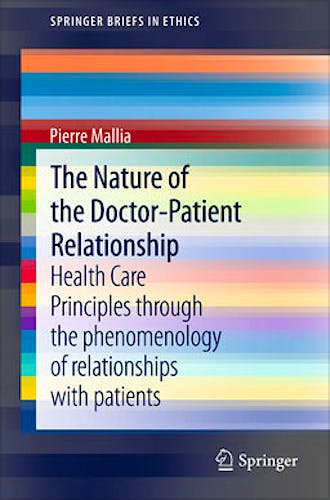

No hay productos en el carrito



The Nature of the Doctor-Patient Relationship. Health Care Principles through the Phenomenology of Relationships with Patients (Springerbriefs…)
Mallia, P.
1ª Edición Agosto 2012
Inglés
Tapa blanda
86 pags
300 gr
null x null x null cm
ISBN 9789400749382
Editorial SPRINGER
LIBRO IMPRESO
-5%
51,95 €49,35 €IVA incluido
49,95 €47,45 €IVA no incluido
Recíbelo en un plazo de
2 - 3 semanas
ABOUT THIS BOOK
This book serves to unite biomedical principles, which have been criticized as a model for solving moral dilemmas by inserting them and understanding them through the perspective of the phenomenon of health care relationship. Consequently, it attributes a possible unification of virtue-based and principle-based approaches.
Content Level » Research
Keywords » biomedical principles - health care ethics - health care principles - health care relationships
Related subjects » Applied Ethics & Social Responsibility - Health Psychology & Behavioral Medicine - Medicine
TABLE OF CONTENTS
Introduction.CHAPTER 1 Critical overview of principlist theories.
- The ‘Four-Principles’ Approach.
- Theoretical basis.
- The Paradigm case.
- The doctor-patient relationship.
- Robert Veatch’s model of Lexical Ordering.
- The Principle of Permission.
CHAPTER 2 Phenomenological roots of Principles.
- The nature of the physician-patient relationship.
- Communication.
- Goals of Medicine.
- The ‘care’ in Health Care.
- The special bond.
- The Principle of Beneficence and virtue.
- Nonmaleficence.
- Patient authority or trust.
- Epistemology.
- Respect for Autonomy.
- A historical and epistemological perspective.
- A cultural appraisal.
- The dual nature of Justice.
- The Justice of society.
- Justice in Health-Care.
CHAPTER 3 Principles as a consequence of the relationship.
- Need for grounding principles in.the relationship.
- Defining the ontological entities.
- The physician as an entity.
- Levelling-down of medical relationships.
- Being as Understanding.
- The Patient as entity - potential for being truly-autonomous.
- Dimensions of the illness experience.
- True Autonomy and the Authenticity of the relationship.
- Hermeneutics of the relationship.
- Phenomenology of the clinical encounter.
CHAPTER 4 The principle of Justice in a secular society.
- Being-with-one-another and the Golden Rule.
- Being-with-one-another.
- The Golden Rule.
- Common Values.
- Implications in Bioethics.
- The naturalistic fallacy.
- Common morality and Being-with-one-another.
- Confronting rival traditions.
- Being-with-one-another.
CHAPTER 5 The question of social construct theories Reappraising and phenomenology of the doctor-patient relationship.
- Post-modernism and medicine.
- Socially constructed theories.
- A philosophy based on the phenomenology of the relationship.
- The ontology of the patient, the doctor and the relationship.
- Truth concealed.
- The Clinical Encounter.
CHAPTER 6. Conclusion.
BIBLIOGRAPHY.
© 2026 Axón Librería S.L.
2.149.0